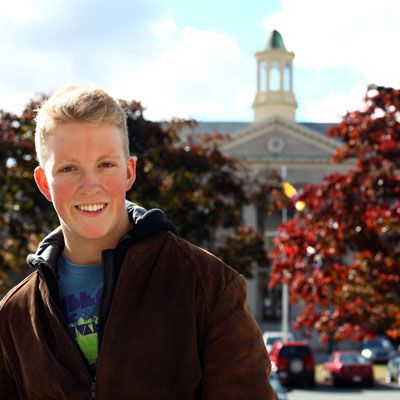 |
| Daniel Brown describes the no-impact experiment as "environmental shock therapy that is meant to highlight our dependencies on unsustainable systems." (Bruce Bottomley Photo) |
Could you rely solely on two feet and a heartbeat as a means of transportation for a day? How about a week? A year?
Would you be able to eat only locally and organically grown foods- which would include giving up sugar and caffeine?
Finally, do you think you could commit to not creating any absolute waste? That is, not getting rid of anything that could not be recycled or composted?
Consider these questions and then consider the average life of an urban dweller; zipping around the city on the bus, buying a cup of coffee to get started in the morning, picking up take-out in a Styrofoam container as you rush home from work.
Seems like it might be kind of a tough challenge doesn’t it?
A group of University of King’s College students decided to try to live impact free for one week. Organizer Daniel Brown describes the experiment as “environmental shock therapy that is meant to highlight our dependencies on unsustainable systems.”
The experiment started on October 16 and wrapped up on October 22 with a well deserved celebration at Propeller Brewery. Approximately 40 students took a pledge to live with no net impact for seven days. The idea of taking a pledge was designed to make participants more accountable.
“If you’re only accountable to yourself, it can be easy to rationalize why you should break or bend the rules. By taking a pledge, you’re making yourself accountable to a community and you have a built-in support system,” says Mr. Brown.
The idea of fostering a sense of community is something that is very important to Mr. Brown, a third-year international development and sustainability student originally from Vancouver, British Columbia.
According to the Dark and Dirty: The No Impact Experiment ‘zine, “the loss of ‘we’ is partially responsible for the current environmental crisis…This is an experiment in community as much as individual action.”
The Halifax community at large has certainly taken notice of the experiment. Halifax MP Megan Leslie is a big supporter of the experiment.
“The No Impact Experiment is a fantastic initiative. They've set it up so that it is accessible to people: it's not about being perfect or about winning, it's about thinking critically about the food we eat and the way we live,” says Ms. Leslie.
In addition to eating locally, boycotting oil for transportation and eliminating waste, several events were scheduled for the week-long experiment. Events such as a used/vintage clothing sale, cooking classes and an eco-trivia night featuring local beer were meant to show students that living impact free can be fun and easier than one might think.
The No Impact Experiment is based on a year-long project by Colin Beaven aka “No Impact Man”. The Beaven family, who lives in the heart of Manhattan, decided to try to live with no net impact for an entire year. The experiment drew a considerable amount of attention and inspired a blog, book and documentary film.
After viewing No Impact Man, Mr. Brown was inspired to try the experiment himself.
“I’ve studied about the negative impacts on our environment for too long to not take action in my own life,” says Mr. Brown. “This is only the beginning. I want to find ways to inspire other people to take part in this wonderful communal adventure.”
